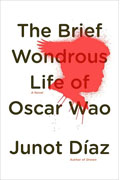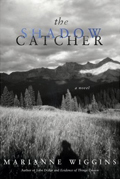
The Morning News Tournament of Books, sponsored by Powell’s Books, is an annual battle royale amongst the top novels in “literary fiction” published throughout the year. Read more about this year’s tournament »
» Buy the Books at Powells.com «
» Meet This Year’s Judges «
» Wager for Charity «
» Relive the Action: ’07, ’06, ’05 «
» Contact the Tournament Staff «
• SEMIFINALS • MATCH TWO •
From the Booth
 |
The Brief Wondrous Life of Oscar Waoby JUNOT DÍAZ |

|
| v. | ||
The Shadow Catcherby MARIANNE WIGGINS |
commentary by KEVIN GUILFOILE & JOHN WARNER
KEVIN: Many observers of this year’s Tournament have been predicting a Díaz-Ferris final since the early stages, some even lamenting the inevitability of it.
But of course, that’s not what we have. Not yet.
Last fall we asked TMN readers to submit their favorite books of 2007. That list was one of the factors we used to choose the 16 books that would ultimately make the Tournament. And now we’re going back to our readers’ favorites one more time.
Fourteen novels have been eliminated from the Tournament so far. From those books we will rescue the two that were best loved by TMN readers last year and bring them back from the dead in a pair of resurrection duels we call the Zombie Round. In order to get to the finals, Ferris and Díaz will each have to get past a book left for dead. Presumably an angry book. An angry, pus-oozing, brain-eater of a novel that has been given a second chance at the title.
Tomorrow, Joshua Ferris’s Then We Came to the End will meet Tom McCarthy’s Remainder in a battle of celebrated debuts. Then on Friday, The Brief Wondrous Life of Oscar Wao by Dominican-American Junot Díaz will square off against Chilean Roberto Bolaño’s The Savage Detectives.
Buckle up and vamonos.
JOHN: Somewhere, Mark Sarvas is smiling. I have to say, all of the talk about The Savage Detectives, both pro and con, has the book officially in my to-be-read pile. Where there’s a fuss, there’s probably something interesting going on.
I feel like I’m going to fracture my hand from patting ourselves on the back, but as Karen Templer at The Readerville Journal notes, one of the things our little Tournament does is make books an event, which is pretty rare these days and very much to our beloved industry’s detriment.
Which brings me to another installment in my ongoing series of half-cocked semi-rants against the prevailing wisdom in the publishing industry. (I think these commentaries have caused me to become a little over-fond of my own voice, but we’re getting near the end, so what the hell, it’s not like I’ve reserved iknoweverything.blogspot.com for myself or anything. Plus, I’m currently on Spring Break from my teaching work, so it’s either yammer on about this stuff or suck tequila shots out of an 18-year-old’s navel on South Padre, neither of which my wife finds a productive use of my extra time, but only one of which will end in divorce.)
The reason I’ve added not just The Savage Detectives, but The Brief Wondrous Life of Oscar Wao, What the Dead Know, Shining at the Bottom of the Sea, and now The Shadow Catcher to my to-be-read pile is because over the past couple of weeks I’ve been privy to intelligent and engaging voices discussing these books—not just in terms of “good” or “bad,” but in terms of their themes and narrative styles, and their approaches to the medium. All of this talk gets me eager to get in on the conversation, which necessitates reading the books.
This phenomenon illustrates just how hard it can be to induce someone to buy a book. For something that’s relatively cheap, books have to clear an exceedingly high information threshold for most people to pull the trigger and snatch one up.
On the one hand, books are like any other product, a commodity where people must make a yes/no decision. To buy or not to buy, that is the question. When a book is seen as an event—an Oprah recommendation, the next Stephen King novel, Harry Potter—the decision is fairly straightforward, often made on the basis of past experience, i.e., “I like Oprah’s recommendations or Mr. King’s books,” or, “I want to see if Harry and Hermione hook up, therefore I will buy the sequel.” Pretty straightforward, not much different than buying toothpaste: In the past, this brand kept tartar at bay while preventing people from keeling over in the presence of my breath, therefore I shall purchase it again!
However, as everyone knows, the vast majority of the books published are not events. In fact, the vast majority are not noticed at all by anyone other than the author’s family and friends. They receive very little publicity and garner few reviews. There’s only one, or at best a handful of Then We Came to the Ends every year, where the publicity can manage to manufacture an event. Most books, particularly literary fiction, never join the culture conversation.
Still, even though I think the key to the industry’s success is to broaden the conversation about books as much as possible, I want to set that aside for now to address the cruel current reality, which is that for most of us, the only conversation starter we have is our book’s cover, since it’s the only information about our book that a potential reader is likely to encounter.
I agree with Nick Hornby in this case that Marianne Wiggins’s title and jacket do little to convey the apparent depth and complexity and likely entertainment value of her work. They do indeed make one a little sleepy. I could pass by that book on the new-fiction table 100 times and it just wouldn’t call out to me, saying, “Pick me up, read my description, check out my blurbs.” The sad part is that, based on the Tournament talk, it sounds like a book I’d enjoy.
In reality, the cover is even more important than just getting consumers to pick up the book once it’s in the store. The “most important person in publishing,” Sessalee Hensley, the literary fiction buyer for Barnes & Noble, apparently puts great stock in the book jacket, as quoted in a Wall Street Journal article:
Those of a more philosophical turn want to know whether you can, indeed, judge a book by its cover. “My high-school English teacher would say absolutely not, but I now know better,” says Ms. Hensley. “I can never remember if it’s .26 seconds or .026, but that’s how long a customer has to decide to pick up a book. I’m trying to suck up every sale off the street, and if the jacket’s not quite right it makes it a harder thing to do.”So, really, the first hurdle for any piece of literary fiction is to have a cover that grabs Sessalee Hensley. She’s not wrong about the phenomenon of .26 seconds at all, but step back and think about how narrow a needle the average work of literary fiction has to thread to even get stocked in stores in significant numbers, let alone purchased.
Publishers know all this, and therefore spend a tremendous amount of time and energy coming up with titles and developing jacket treatments. I know you experienced this with Cast of Shadows as I did with Fondling Your Muse and my current effort, So You Want to be President?. In fact, my original title for Fondling Your Muse (a satire of writing advice books) was Sleeping With Oprah and Other Routes to the New York Times Bestseller List. I think the publisher probably bought the thing on the title alone since they knew that would get people talking. They ultimately got (justifiably) gun shy about using Oprah in the title since she’s trademarked her name and a lawsuit seemed almost inevitable. (You want people talking about your book, but not to the point it brings out a cease-and-desist order.)
The thing is, I’m not aware of any publishers that actually go out and test their book jackets or titles in front of consumers, giving them that .26 seconds Ms. Hensley talks about to see if the cover is working at starting the necessary conversation that will ultimately get them to carry that book to the checkout counter. The usual process is for the designers and editors and marketers and sales people (and sometimes the author) to look at the different options and talk about how they think people will perceive the cover without any actual information from which to make these assumptions, relying almost entirely on the WAG (wild-ass guess) model of decision making.
Do an experiment. Take The Shadow Catcher to the streets and ask 100 people to describe what kind of book they’d expect based on the jacket. My hunch (though it’s just another WAG) is that the opinions will be similar to Nick Hornby’s. This indicates that they’ve created a package that’s actively repelling their potential audience.
I’m not trying to slag on publishers. I love them; in fact, I sort of am one, but doing things the same way because that’s how we’ve always done them in the face of an obviously declining industry doesn’t make sense to me. There are many ways to test if a book’s jacket and title are going to be effective without compromising the artistic integrity of the work contained inside; we don’t explore any of them. Imagine being able to rely on something other than, or in addition to, Sessalee Hensely’s admittedly well-tuned gut instinct.
(Note to publishers who have been swayed by my brilliance on the potential efficacy of market testing book jackets: Give me a call; I know people who can help with this.)
KEVIN: If I can put a tangent on your tangent, one of my favorite all-time (and largely unknown) publishing stories involves a publicity stunt you staged for the launch of TOW Books. You wrote a tongue-in-cheek press release that made an offhand reference to the upcoming publication of (the fictional) Kevin Federline’s Guide to Sudoku. That claim was reprinted in Publisher’s Weekly as if it were serious and TOW received thousands of orders for that title from bookstores. This is a wild-ass-guess business indeed.
Now back to the Tournament bloodshed!

» DOWNLOAD THE BRACKETS «
• Round One •
Tree of Smoke v. Ovenman
judged by Tobias Seamon
The Savage Detectives v. Let the Northern Lights Erase Your Name
judged by Elizabeth Kiem
Then We Came to the End v. Petropolis
judged by Anthony Doerr
You Don’t Love Me Yet v. New England White
judged by Jessica Francis Kane
Run v. Shining at the Bottom of the Sea
judged by Kate Schlegel
What the Dead Know v. The Brief Wondrous Life of Oscar Wao
judged by Elizabeth McCracken
On Chesil Beach v. Remainder
judged by Ze Frank
The Shadow Catcher v. An Arsonist’s Guide to Writers’ Homes in New England
judged by Helen DeWitt
• Round Two •
Tree of Smoke v. Let the Northern Lights Erase Your Name
judged by Mark Sarvas
Then We Came to the End v. You Don’t Love Me Yet
judged by Maud Newton
Shining at the Bottom of the Sea v. The Brief Wondrous Life of Oscar Wao
judged by Ted Genoways
Remainder v. The Shadow Catcher
judged by Mark Liberman
• SEMIFINALS •
Tree of Smoke v. Then We Came to the End
judged by Gary Shteyngart
The Brief Wondrous Life of Oscar Wao v. The Shadow Catcher
judged by Nick Hornby
• ZOMBIE ROUND •
Then We Came to the End v. Remainder
judged by Rosecrans Baldwin
The Brief Wondrous Life of Oscar Wao v. The Savage Detectives
judged by Andrew Womack
• FINAL ROUND •
Remainder v. The Brief Wondrous Life of Oscar Wao
All Judges + Jennifer Szalai